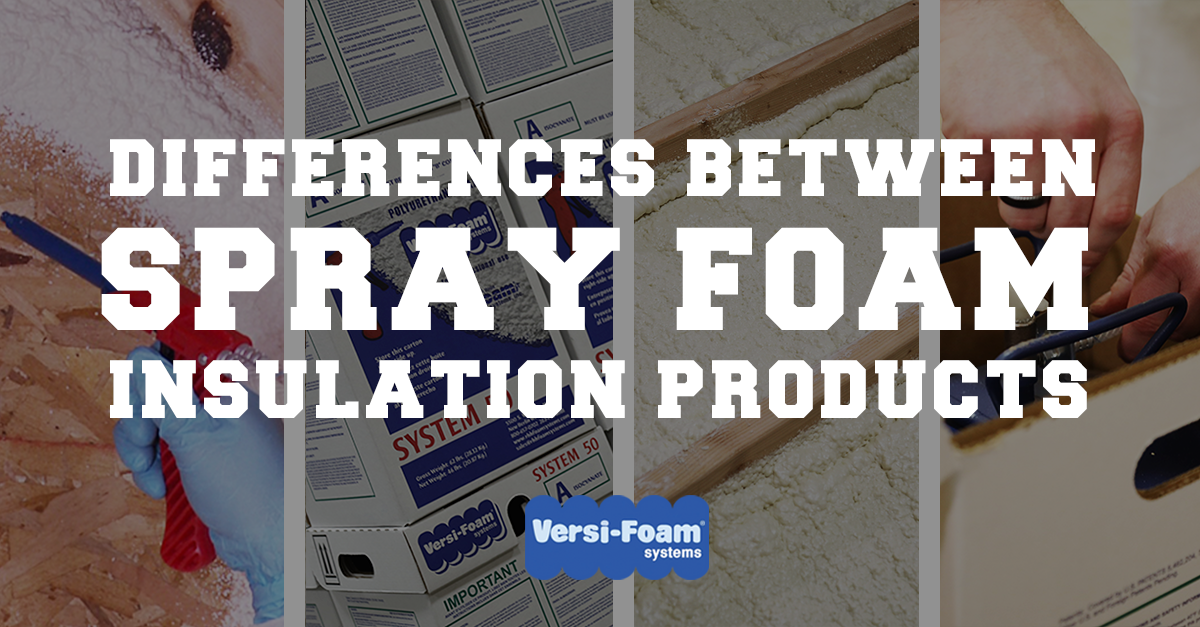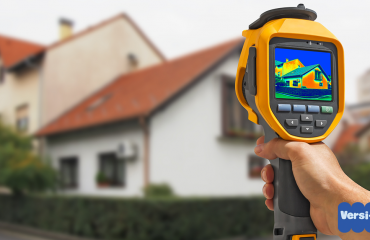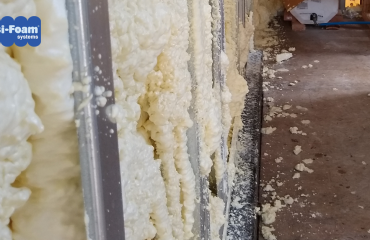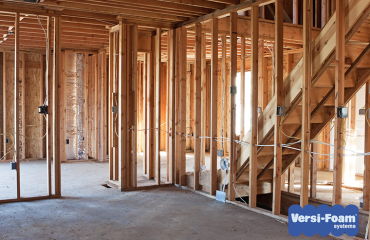VersiFoam® spray foam insulation products come in several different formulas. The formula you choose will depend on your specific needs. As you plan for your next insulation project, here are some important words and phrases to know.
Spray Foam Insulation Definitions
- Foam – an object formed by trapping pockets of gas in a liquid or solid.
- Closed cell foam – when the pockets of gas in the foam are each completely surrounded by the solid material.
- Open cell foam – when the pockets of gas in the foam connect to each other.
- Density – the degree of compactness of any substance, including foam. Closed cell foam is medium density and open cell foam is low density.
- Permeable – when a substance allows liquids and gasses, such as air, to pass through.
- Heat transfer – the movement of thermal energy from one thing to another thing of different temperature.
- Conduction – the movement of heat from one object to another one (when they are touching each other) that has a different temperature.***
- Convection – the movement of heat because of the movement of warm matter.*** A fan is an example of forced convection. Rising hot air is an example of natural convection.
- Radiant heating – when a hot surface warms others around it, such as a fire in a fireplace.***
- R-value – the capacity of an insulating material to resist heat flow.
Closed-cell foams do not have interconnected pockets, whereas the pockets in open-cell foams are interconnected. This means that within a closed cell formula, gas or liquid will not move from one cell to another, while within an open cell formula it will. To visualize an open cell foam, think of a sponge. To visualize a closed cell foam, think of a swim noodle.
This has important implications for insulation. If open cell foam becomes filled with moisture, it’s insulating properties will be reduced because that moisture will flow throughout the insulated area. On the other hand, if those pockets are filled with air the insulating properties will be increased for the same reason. If your insulating material will be exposed to moisture, you want to select a closed cell formula.
R-value is an important measurement for green building practices. It refers to how much an insulating material can resist conduction heat transfer. Conduction heat transfer moves warm air out of the building in the winter and into the building in the summer. Again, the R-factor of closed cell spray foam is higher than that of open cell spray foam because the pockets are self-contained.
Two other methods of heat transfer exist in buildings. The first, convection, describes heat movement and can happen either naturally or artificially. The second, radiant heating, happens when heat is transferred across an open space. In this instance, energy “radiates” from the heat source. Spray foam insulation can be used to reduce heat transfer in these circumstances as well.
Open Cell Spray Foam
- Density: .75 lbs per cubic foot
- R-value: 4 at 1” thick
- Features
-
- Spray applied
-
- High expansion rate
-
- Soft and flexible after curing
-
- Impermeable to air
- Benefits
-
- Quick and easy application
-
- Less foam is needed = more economical
-
- Adjusts if the building settles over time
-
- Absorbs sound
- Applications
-
- Residential roof decks: attics, garage roofs, cathedral ceilings
-
- Open cell foam is somewhat permeable to moisture which means that it should not be used against wet or moisture impermeable surfaces.
Closed Cell Spray Foam
- Density: 2 lbs per cubic foot
- R-value: 7.7 at 1” thick
- Features
-
- Spray applied
-
- High R-value
-
- Poor conductor of heat
-
- Impermeable to air and moisture
- Benefits
-
- Quick and easy application
-
- Suitable for both cavity fill and continuous exterior applications
-
- Blocks air movement in a wall cavity which eliminates heat transfer from warm areas to cold areas
-
- One of the best insulation materials available
- Applications
-
- Most commercial and industrial applications
-
- Wall or ceiling insulation
-
- Tank and pipe insulation
-
- Marine flotation
-
- Truck/trailer insulation
-
- Sculpting and molding
-
- Pool and spa insulation
-
- Closed cell foam is excellent for condensation control and sound dampening.
Closed Cell Spray Foam
- Density: 2 lbs per cubic foot
- R-value: 6.7 at 1” thick
- Additional features to closed cell spray foam standard formula
-
- Flame retardant
-
- Class 1 in accordance with ASTM E-84
-
- Anti-microbial formula
- Benefits
-
- Will limit flame spread and smoke development if exposed to a fire
-
- Stops mold from growing on the surface of the foam
- Applications
-
- Recommended for use in inhabited buildings
High Density Closed Cell Spray Foam
- Density: 2.8 lbs per cubic foot
- R-value: 7.7 at 1” thick
- Features
-
- High compressive strength
-
- Does not expand as much as the other VersiFoam systems
- Benefits
-
- Stronger and harder when completely set
-
- It strengthens the structure that it is applied to
- Applications
-
- Outdoor use
-
- Cryogenics
-
- Polyurethane foam roofing repair
-
- Because of the higher density, it requires more material to cover a given space.
VersiFoam® open cell foam comes in two systems: 31 and 100. #31 is a medium system that will produce 31 cubic feet of foam. #100 is a large system that will produce 100 cubic feet of foam. Both systems can be shut down and used later, although we do recommend that the product be used within 30 days of opening.
VersiFoam® closed cell foam comes in five systems: 1, 9, 15, 50, and 700. The first four are available in both the standard and class 1 formula. They Hy-Flo system 700 is only available in class 1.
VersiFoam® slow rise foam is available in three systems: 9, 15, and 50. Each of these is available only in the class 1 formula. High density is available in system 10 and system 33.
Spray foam insulation is a high performance material. It can fill wall cavities and voids completely. It greatly reduces or eliminates heat transfer, air flow, and moisture flow in homes and buildings. It provides a high resistance to heat flow (R-value) for the money.
If you have more questions about the types and uses of our spray foam insulation products, please give us a call at 1.800.657.0702. We look forward to hearing from you.




